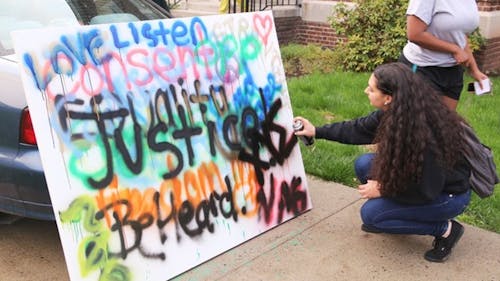Rutgers shatters silence on sexual violence with annual 'Take Back the Night' march

Students rallied together to shatter the silence surrounding victims of sexual and gender assault and support survivors last night by marching down George Street to Voorhees Mall.
"Take Back the Night" is a nationwide protest across college campuses that began in the 1970s with the goal of ending sexual and gender violence in all forms.
Women Organizing Against Harassment (WOAH) worked with Douglass Residential College (DRC) and the Violence Prevention Victim Assistance (VPVA) to organize the annual march.
Supporters met in the Jameson Courtyard on Douglass campus where Vice Chancellor Felicia McGinty spoke before marching down George Street to Voorhees Mall on the College Avenue campus, where there was a concert at Scott Hall.
At Jameson, students made posters, learned chants and were taught defense mechanisms by the Martial Arts Club.
Kaila Boulware, a School of Arts and Sciences senior, organized the rally and hoped to bring awareness to the Rutgers and New Brunswick community about the prevalence of sexual violence.
“If people know more about this issue, I feel like we can decrease the numbers in assault, especially on college campuses,” Boulware said. “I want this event to be a safe space for students to come and speak out.”
Raven Jenerson, a School of Arts and Sciences sophomore, said she wanted there to be a safer space so survivors can feel supported.
“There should be an overall atmosphere of understanding of the prevalence of sexual assault and gender-based violence, and it’s not as far-fetched as everyone thinks," Jenerson said. "It’s in our community, on our campus, in our residence halls, and I want to create a movement to change that culture."
Jenerson hoped victims of sexual assault are one day able to go to the University for help, but she did not think there is a clear-cut support system available at the University because of the way that it’s framed.
“Victims stay victims," she said. "There’s not enough support from the University, from their peers. Students would feel re-traumatized going to the University –– a place they give their tuitions dollars to –– and not be supported.”
She said she plans on meeting with the Chief of Staff of Student Affairs, Anne Newman, to discuss the policy of how the University deals with sexual assault, and hopes to update the procedure to help the students while still meeting legal requirements.
“I want to discuss on transparency –– how we get these procedures out there and understood by every student that is out walking this campus. I think the language has to be changed,” she said.
“As it stands right now, there’s a lot of victim blaming and deterrence of victims being able to come forward, and it’s damning to our cause and helping victims get the help and support they need,” Jenerson said.
Matt Gately, School of Arts and Sciences senior, also agreed that there should be more safe spaces available, while also bringing to light that not only women face these issues, but also gay and transgender students.
“We all have a mother, or a sister, or a grandmother, so we always think of it, but also 1 in 6 men are victims of sexual assault so we have to think about that,” Gately said.
He said he plans on making the places we live in safe by marching through them and bringing awareness.
One important issue brought up was consent, and Gately believed that it is also important to talk about it.
“I don’t understand why we need to still teach people what it is because everyone should know at this point,” he said. “We also need to remind them that impaired consent is not consent. If you’re drunk, high or roofied, you can’t consent. If it’s not full consent, you can’t consent, and consent can be revoked at anytime.”
Lack of communication and lack of sex can be two very detrimental things, Boulware said.
"The biggest thing to remember is if it’s not clear they’re not consenting to everything, it shouldn’t go down,” Boulware said.
Gately marched in heels to bring to light that gender assault is not specific to women, but to all genders.
McGinty said the space she saw was one that everyone felt welcome to occupy, no matter gender or background, and was impressed by the diversity present.
“This is really a campus-wide issue,” she said. “For me, this speaks volumes to who we are. We’re not perfect, but we’re trying to be the best at who we are.”
She hopes that the entire campus becomes a safe space and sees the march as a beginning.
“Years ago, this was seen as a women’s issue, and there’s just as many men here supporting today," she said. "So for me, I’m just really hopeful of us creating a campus environment where everyone feels valued and safe."



